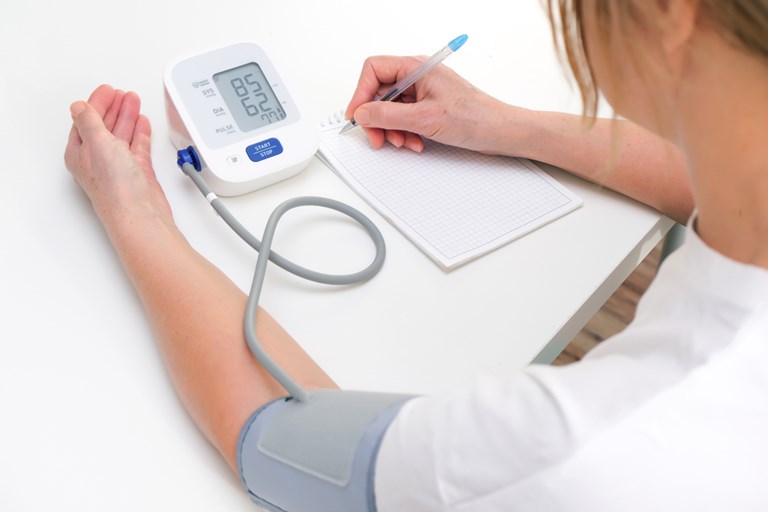As part of our focus on cardiovascular disease, we’re taking a look at ramipril. This commonly prescribed medicine is used to help treat several conditions, including high blood pressure (also known as hypertension). In this blog we’re going to take a closer look at ramipril to understand what it does, how to take it and, ramipril side effects.
What is ramipril and how does it work?
Ramipril is prescribed to help treat high blood pressure, heart failure, and kidney disease, and is also often used after a heart attack. It belongs to a group of medicines known as ACE inhibitors (Angiotensin Converting Enzyme inhibitors) which work by preventing the body from producing a substance that narrows the blood vessels. By doing this, it reduces the risk of developing a more serious condition such as a stroke, heart disease, or kidney disease.

How do I take ramipril, what is the recommended dosage?
The strength and dosage for ramipril may change depending on the reason it’s being prescribed.
When taken for high blood pressure or to reduce the risk of a heart attack or stroke, the typical starting dose for adults is 2.5mg, to be taken once a day. Your doctor will adjust the amount you’re taking until your blood pressure is under control. The maximum daily dose is 10mg, and if you’re already taking diuretics (water tablets), then your doctor may stop or reduce their dosage before starting rampril; or alternatively they may give you a lower 1.25mg dose of ramipril to start with.
Ramipril can also be used to manage patients with kidney disease, and the usual starting dose for this is 1.25mg, to be taken once daily. Working with your doctor, the amount of ramipril you’re taking may be adjusted, up to 2.5mg daily and then 5mg daily.
What should I do if I miss a dose?
If you miss a dose of ramipril, leave out that dose and take your next dose at the usual time. Do not take a double dose to make up for the forgotten dose. If you forget doses often, it may help to set an alarm to remind you. You could also ask your pharmacist for advice on other ways to help you remember to take your medicine.
What should I do if I take too much ramipril?
If you take too many ramipril tablets by accident, contact your doctor or go to your your nearest A&E straight away. An overdose of ramipril can cause dizziness, sleepiness and a pounding heartbeat. The amount of ramipril that can lead to an overdose varies from person to person.
When should I take ramipril?
Ramipril can be taken before, during, or after meals – food does not affect how it works; but it’s best to take it at around the same time each day, and at a time that makes it less likely for you to forget.
How long does it take for ramipril to work?
Peak effectiveness of ramipril are reached within an hour of oral administration. Blood pressure lowering effects are seen within an hour of oral administration with peak effects achieved by four to six hours.
How long does ramipril stay in your system?
Blood pressure lowering effects are maintained for at least 24 hours, although in some patients these effects may diminish towards the end of the 24 hour period. It may take several weeks before optimal blood pressure lowering effects are achieved.
What are the side effects of ramipril?
Like all medicines, there is a chance you’ll experience side effects when taking ramipril, but not everybody gets them.
Common side effects can include:
- headaches
- feeling tired or dizzy (which can happen when your Ramipril dosage is increased because of the lowering of your blood pressure)
- a dry or tickly cough
- fainting
- stomach pain
- chest pain or muscle pain
Common side effects may pass within a few days.
Contact your doctor immediately if you experience any of the serious side effects listed in the patient information leaflet inside the medicine pack. These include any swelling of the face, lips or throat which make it difficult to swallow or breathe, severe skin reactions, a faster heart beat, shortness of breath, unusual bruising or bleeding, or any general malaise that is persistent.
If you’re experiencing side effects, you can talk about them with your pharmacist for more advice and reassurance. You can also report them via the Yellow Card Scheme. This sends a report to the MHRA (the Government’s medicines safety department) which monitors medicines to ensure any safety concerns are collated and recorded.
Does ramipril cause weight gain?
Check with your doctor right away if you have lower back or side pain, decreased frequency or amount of urine, bloody urine, increased thirst, swelling of the face, fingers, or lower legs, weight gain, or increased blood pressure. These could be symptoms of a serious kidney problem.
What other medicines does ramipril clash with?
Rampiril can interact with several other medications. Different interactions can cause different effects. For instance, some can interfere with how well a drug works, while others can cause increased side effects.
Below is a list of medications that can interact with rampiril. This list does not contain all drugs that may interact with rampiril.
Before taking rampiril, be sure to tell your doctor and pharmacist about all prescription, over-the-counter, and other drugs you take. Also tell them about any vitamins, herbs, and supplements you use. Sharing this information can help you avoid potential interactions.
If you have questions about drug interactions that may affect you, ask your doctor or pharmacist.
Potassium supplements
These supplements may increase your blood potassium when taken with ramipril. These supplements include:
- potassium chloride
- potassium gluconate
- potassium bicarbonate
Water pills (potassium-sparing diuretics)
These medications may increase your blood potassium when taken with ramipril. These drugs include:
- spironolactone
- amiloride
- triamterene
Mood stabilizer drugs
Ramipril can increase the levels of lithium in your body. This means that you may have more side effects.
Gold products
When taken with ramipril, certain joint pain drugs can cause side effects. These include reddening and warming of your face (flushing), nausea, vomiting, and low blood pressure. These drugs include:
- injectable gold (sodium aurothiomalate)
Pain drugs
Certain pain relieving drugs can decrease the effect of ramipril on your blood pressure. They can also cause kidney problems. These drugs include nonsteroidal anti-inflammatory drugs (NSAIDs), such as:
- naproxen
- ibuprofen
- diclofenac
Water pills
When taken with ramipril, these medications can increase the risk of very low blood pressure in people with heart failure after a heart attack. These drugs include diuretics, such as:
- hydrochlorothiazide
- chlorthalidone
- furosemide
- bumetanide
- metolazone
- spironolactone
- amiloride
- triamterene
Blood pressure drugs
When taken with ramipril, these blood pressure drugs can increase your risk for very low blood pressure, high blood potassium, and can affect how your kidneys function. These drugs include:
- aliskiren: Don’t take this drug with ramipril if you have diabetes or kidney problems.
- angiotensin receptor blockers (ARBs), such as:
- losartan
- valsartan
- olmesartan
- candesartan
- telmisartan: This drug shouldn’t be used with ramipril.
- angiotensin-converting enzyme (ACE) inhibitors, such as:
- benazepril
- captopril
- enalapril
- lisinopril
Heart failure drugs
Do not take certain heart failure drugs called neprilysin inhibitors with ramipril. When taken with ramipril, these drugs increase your risk for angioedema (severe swelling of the skin). Examples of these drugs include:
- sacubitril
Can I take ramipril with alcohol?
Although alcohol doesn't directly affect the medicine itself, drinking alcohol can increase the blood pressure lowering effect of ramipril, which can increase dizziness and may increase the risk of fainting. If you find ramipril makes you feel dizzy it's best to avoid drinking alcohol.
Can I take ramipril with coffee?
Ramipril increases potassium levels and coffee is high in potassium, so you should avoid drinking it if taking ramipril.
Foods to avoid when taking ramipril
Potassium Rich Foods: Ramipril increases blood potassium level which can lead to irregular heartbeat. It is better to avoid potassium-rich foods like bananas, oranges, green leafy vegetables and salt substitutes containing potassium when you are on ramipril.
Taking ramipril during pregnancy or while breastfeeding
For pregnant women: Ramipril is a category D pregnancy drug. That means two things:
- Research in humans has shown negative effects to the fetus when the mother takes the drug.
- This drug should only be used during pregnancy in serious cases where it’s needed to treat a dangerous condition in the mother.
Talk to your doctor if you’re pregnant or planning to become pregnant. Ask your doctor to tell you about the specific harm that may be done to the fetus. This drug should be only used if the potential risk to the fetus is acceptable given the drug’s potential benefit.
For women who are breastfeeding: Ramipril may pass into breast milk and may cause side effects in a child who is breastfed. Talk to your doctor if you breastfeed your baby. You may need to decide whether to stop breastfeeding or stop taking this medication. When ramipril might not be suitable for you
Alternatives to ramipril
If you cannot take ramipril or other ACE inhibitor medicines because of side effects such as a dry cough, you may be able to switch to another type of blood pressure-lowering medicine. This will usually be an angiotensin receptor blocker, such as candesartan, irbesartan, losartan or valsartan.
Where can I get ramipril?
At Pharmacy2U, our team of qualified UK-based pharmacists work with your GP, to get the medication you need delivered directly to you, for free. Every patient who uses Pharmacy2U means the NHS pays less in fees than they would an average high street pharmacy. To find out more about how we can help you or your friends and family with long term health conditions, visit our NHS Repeat Prescription service.
